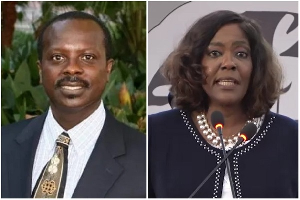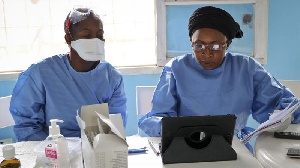By Dr. Michael J.K. Bokor
E-mail: mjbokor@yahoo.com
February 14, 2010
Like a birth-mark that sticks to the body and draws attention to itself, ex-President Rawlings has refused to fade away and still remains in news bulletins. He is known for generating news reports by his utterances and (mis)deeds, etching himself on everybody’s memory. This time, however, he is not the agent. The event has happened to him and his family, following the extensive destruction caused by Sunday’s early morning blaze at their Ridge residence. I sympathize with them and wish them all the best as they cope with the calamity. I don’t know exactly how much property the Rawlingses might have had in their residence or what specifically got destroyed in the blaze; but I can guess that hordes of irreplaceable property (personal effects and precious collections of artefacts symbolizing many years of their achievements) might be involved. Considering issues, I can only opine that the calamity goes beyond their personal lives. It is heart-breaking for the entire country too because of the cultural and historical significance of such artefacts and other personal collections, which might one day find their way into a national monument. This loss is worth lamenting over and over again. No one should dare disregard the Rawlings legacy.
On a more serious note, however, this destruction and the inability of the Ghana National Fire Service and other disaster management institutions to tackle the blaze (which occurred during a major rainstorm!) is disappointing. This flop reinforces concerns that our governments over the years have not done our country any good service as far as strengthening its institutions to ensure public wellbeing is concerned.
The destruction that the perennial spate of industrial, domestic, and bush fires have caused is unquantifiable. Yet, nothing concrete has done to tackle the problem from the perspective of logistics. Every now and then, whenever such a disaster strikes, the authorities make grandiose pronouncements on intentions to provide logistics and infrastructural support to the Fire Service (whether the Ghana National Fire Service or other fire-prevention organs in the Ghana Armed Forces, Civil Aviation Authority, or elsewhere). Unfortunately, as soon as the dust settles, nothing gets done.
Equipping such institutions and motivating their personnel has remained a pipe-dream as the authorities rather divert funds to serve obviously ludicrous or outrightly stupid agenda. All the public funds that Rawlings spent celebrating 40 years of Ghana’s independence, which Kufuor raised to well over $50 million for the Ghana@50 madness or the $170 million wasted by Kufuor on the Jubilee House, or the millions dissipated on per diem allowances come to mind. Could no one in government have thought better on how to spend the country’s resources? Some of us have complained bitterly about this misuse of funds for such senselessness only to be insulted by those not thinking the way we do. Some have allowed their political sentiments to control them in their assessment of national issues. Indeed, it is saddening to realize that while the profligacy continues, there are still people who are willing to sacrifice their lives in support of the erring authorities. The result is what we are confronted with when least expected.
Neglecting the Ghana National Fire Service has its dire consequences. That’s what has happened over the years. Under Rawlings, however, some sense of urgency seemed to be pumped into the operations of the Ghana National Fire Service such that the institution’s image became enhanced enough for it to attract public interest. Some logistics were provided and the activities of the Service caught the attention of job seekers. At least, the Ghana National Fire Service at that time could stand shoulder-to-shoulder with the other Security Services.
I don’t know what Kufuor did to uplift that image under his 8-year rule. Under the current NDC government, there is nothing new to be proud of. If anything at all, the Fire Service has come to attention mostly because of complaints against poor service conditions and threats from its personnel. The institution is still without the funding and logistic support it needs to stand on its feet. When disaster strikes, its personnel have nothing with which to tackle it but end up being blamed.
The madness in misuse of public funds continues unabated. Under President Mills’ government, much money has been spent on entertainment (take the one by the Transitional Team and the recent one by the Ministry of Education, for example), procurement of vehicles for government functionaries, per diem allowances, and many more, while needy institutions continue to wallow in misery. The emphasis has continued to be on serving personal and parochial interests without anyone’s conscience being pricked against that waywardness! This kind of unregulated greed that has occasioned national life is disarming.
Everything is haywire in the management of resources in our country. Buildings have been constructed on waterways, spaces marked for public projects, lands under conservation for other purposes, forest reserves, and many others. There is no discipline in national life.
Although the Department of Town and Country Planning (or whatever it is called) knows that it has rules and regulations to enforce that will prevent the haphazard putting up of structures that prevent access to objects in distress, nothing seems to get done. Where anything seems to be done, at all, political interference negates it such that no one can enforce those very rules and regulations until disaster strikes. Eventually, the useless demolition exercises have only angered the public all the more.
The worn-out maxim that “A stitch in time saves nine” may have its relevance for us at this time that this disaster has struck the Rawlingses and drawn reaction from people across the political spectrum. How much will it take for the government to provide the logistics that the Ghana National Fire Service needs to do its work efficiently? For once, will anybody put on his or her thinking cap to fight for the Ghana National Fire Service to be retooled? It is sickening for the government to continue to neglect such an institution only to turn round to blame it when disaster strikes.
All the major fire disasters that have occurred so far(and not tackled)—starting from the Kumasi Central Market, the Tema Central Market, the Agbogbloshie Market, the Ministry of Foreign Affairs, the Tema Oil Refinery, and the Rawlingses’ residence—suggest that there is a lot wrong with our system. This kind of slipshoddiness cannot build a country.
We must pause to reconsider our national priorities. Once we know that fire disasters (whether industrial, domestic or bush) are a major perennial national problem, why don’t we provide the necessary input to the institutions that have been established to tackle them?
No one can predict when such fire disasters will occur; but, at least, we should not leave anything to chance. That is why it is important for the government to retool the Ghana National Fire Service, particularly, and ensure that it is adequately supported to perform the tasks associated with fire-prevention that have now become our Public Enemy Number One!
Our leaders (past and present) are culpable for not doing anything drastic to uplift the Fire Service. The burden is now on President Mills to do the right thing. If it means looking for loans purposely to assist the Service, his government must do so with all the zeal and sense of duty that it can muster up. If the government could dole out $20,000 dollars to each member of the Black Stars and $50,000 to each of the 230 MPs as car loans, what prevents it from spending money to support the Fire Service to make it viable? If fire strikes the property of all these people benefiting from this misplaced largesse, how do they hope to save it without the involvement of the Ghana National Fire Service? It is a matter of common sense that the government has to support this institution of state to function properly. It must, therefore, go without saying that if we have a well-equipped Fire Service and a conscientious and motivated corps of personnel, tackling fire disasters should be less intimidating than what it has been over the years.
Government appears to be more interested in the National Disaster Management Organization (NADMO). For obvious reasons, it appears to be on government’s radar because of the political capital it seeks from its operations even though, to me, NADMO is merely REACTIVE while the Ghana National Fire Service is both PROACTIVE and REACTIVE and must be supported to the hilt.
This disaster at the Rawlingses must prompt change. No one knows where the calamity will come from next but if a stitch in time is to save nine for us, it must start right now from the one who holds the purse strings—the NDC government! Any failure to do so will add to President Mills’ woes during election time. For now, he may be drawn toward taking the first step toward sympathizing with the Rawlingses and setting in motion the mob mentality. And as is the routine in a communalistic society, many Ghanaians (including NDC bigshots and ex-President Kufuor and his NPP) have quickly responded to the disaster by sympathizing with the victims. But the real issue must go beyond this public show of sympathy or empathy.
No one should just sympathize with the Rawlingses and leave matters there. A mere show of sympathy will not solve this problem of fire disasters in the country. I say: Support the Fire Service now to serve Ghanaians better!!
Opinions of Monday, 15 February 2010
Columnist: Bokor, Michael J. K.















